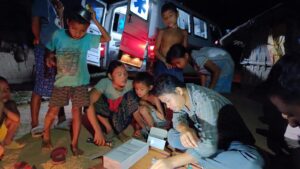Bagachatal AYUSH AAM Sub Centre in Gomati District achieves a 92% malaria case reduction since 2023, showcasing an inspiring public health success through community-driven healthcare, strategic outreach, and strong local commitment in Tripura’s remote hilly region.
In a landmark public health achievement, the Bagachatal AYUSH AAM Sub Centre, located in the remote and hilly region of Silachari Block, Gomati District, has reported a stunning 92% reduction in malaria cases over the past two years. This milestone reflects the unwavering commitment and coordinated efforts of healthcare workers serving in one of Tripura’s most challenging terrains.
A Challenging Setting Turned Into a Success Story
Bagachatal, an Autonomous District Council (ADC) village under the Karbook subdivision of Gomati District, is home to around 1,524 residents, most of whom depend on Jhum cultivation (shifting agriculture) for their livelihood. The area is marked by dense forests, rugged hills, and poor road connectivity, making access to healthcare services extremely difficult. For years, the village had battled high malaria transmission rates, posing a persistent public health challenge.
In 2023, the sub-centre faced one of its worst malaria situations. Out of 7,349 blood samples tested, 478 malaria cases were confirmed—201 Plasmodium Vivax (PV), 268 Plasmodium Falciparum (PF), and 9 mixed infections—resulting in an Annual Parasite Incidence (API) of 312, one of the highest in the region.
Leadership, Strategy, and Community Mobilization
Recognizing the urgency, the AYUSH AAM team, led by Dr. Sumit Bhattacharjee, AYUSH Community Health Officer, and guided by Dr. Bhaghyanita Jamatia, Medical Officer in Charge (MOIC) of Ghorakappa Primary Health Centre, launched a comprehensive malaria control initiative.
The campaign focused on several key strategies:
Door-to-door awareness campaigns promoting mosquito prevention and early testing.
Regular blood sample collection drives to detect malaria at an early stage.
Use of insecticide-treated bed nets (ITNs) and indoor residual spraying (IRS).
Health education through ASHA workers, emphasizing hygiene and preventive care.
Prompt treatment protocols to ensure zero fatalities.
The Bagachatal health team, comprising one AYUSH CHO, one Multi-Purpose Worker (MPW), and five ASHA workers, played a pivotal role in implementing these measures with precision and compassion, despite the geographical hardships.

Remarkable Results in 2024 and 2025
The impact of these interventions became evident within a year. By 2024, from 6,655 samples tested, the API dropped to 100, with only 151 confirmed cases—including 78 PV, 68 PF, and 5 mixed infections.
The trend of success continued into 2025. Up to September 2025, 4,417 samples were tested, revealing just 35 positive cases—21 PV, 12 PF, and 2 mixed cases—resulting in an API of 22. Most notably, no malaria-related deaths were reported during this period.
This transformation—from an API of 312 in 2023 to just 22 in 2025—represents an extraordinary 92% reduction in malaria cases within two years.
A Model for Remote Healthcare Delivery
The Bagachatal experience demonstrates that well-coordinated healthcare systems can produce remarkable results even in resource-constrained and geographically isolated areas. The collaboration between government health programs, community volunteers, and AYUSH practitioners has become a model for malaria control across Tripura.
Officials attribute this success to continuous monitoring, health education, and proactive surveillance, which ensured that malaria transmission chains were broken swiftly. The resilience of the healthcare team and the cooperation of the local community were instrumental in achieving this unprecedented outcome.
Looking Ahead
As Bagachatal celebrates this milestone, it stands as a beacon of hope for malaria elimination in India’s northeast. The success story emphasizes that strategic interventions, when combined with community engagement and sustained effort, can turn even the most malaria-prone regions into success stories.
The ongoing efforts by the AYUSH AAM Sub Centre continue to focus on sustaining the low API rate, strengthening disease surveillance, and enhancing preventive care awareness to ensure that the gains made are not reversed.
| Also Read: Agartala Mayor inspects Smart City Drainage works for Monsoon readiness |
Bagachatal’s achievement not only strengthens Tripura’s fight against malaria but also contributes significantly to India’s National Framework for Malaria Elimination (NFME) 2030 goal—proving that no region is too remote for success when determination meets dedication.













